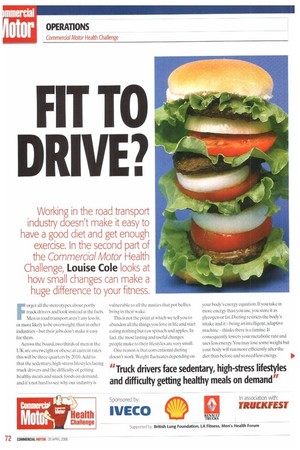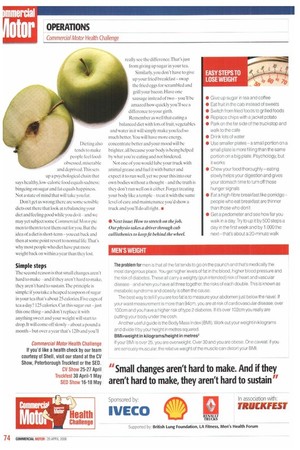FIT TO DRIVE?
Page 72

Page 74

If you've noticed an error in this article please click here to report it so we can fix it.
Working in the road transport industry doesn't make it easy to have a good diet and get enough exercise. In the second part of
the Commercial Motor Health Challenge, Louise Cole looks at how small changes can make a
huge difference to your fitness.
Forget all the stereotypes about portly truck drivers and look instead at the facts. Men in road transport aren't any less fit, or more likely to be overweight, than in other industries— but their jobs don't make it easy for them.
Across the hoard, two thirds of men in the UK are overweight or obese; at current rates this will be three quarters by 2010. Add to that the sedentary, high-stress lifestyles facing truck drivers and the difficulty of getting healthy meals and snack foods on demand, and it's not hard to see why our industry is vulnerable to all the nasties that pot bellies bring in their wake.
This is not the point at which we tell you to abandon all the things you love in life and start eating nothing but raw spinach and apples. In fact, the most lasting and useful changes people make to their lifestyles are very small.
One reason is that conventional dieting doesn't work. Weight IhicI il,ltes depending on your body's energy equation. If you take in more energy than you use, you store it as glycogen or fat. Dieting restricts the body's intake and it—being an intelligent, adaptive machine — thinks there is a famine. It consequently lowers your metabolic rate and uses less energy.You may lose some weight but your body will run more efficiently after the diet than before and so need less energy.
Dieting also tends to make people feel food obsessed. miserable and deprived.This sets up a psychological chain that says healthy,low-calorie food equals sadness: bingeing on sugar and fat equals happiness. Not a state of mind that will take youfar.
Don't get us wrong: there are some sensible diets out there that look at rebalancing your diet and feeling good while you do it and we may yet subject some Commercial Motor pie men to them to test them out for volt. But the idea of a diet is short-term-you cut back and then at some point revert to normal life.That's why most people who diet have put more weight back on within a year than they lost.
Simple steps The second reason is that small changes aren't hard to make and if they aren't hard to make, they aren't hard to sustain.The principle is simple: if you take a heaped teaspoon of sugar in your tea that's about 25 calories. Five cups of lea a day? 125 calories. Cut this sugar out -just this one thingand don't replace it with anything sweet and your weight will start to drop. It will come off slowlyabout a pound a month but over a year that's 12lb and you'll
really see the difference.That'sjust from giving up sugar in your tea.
Similarly, you don't have to give up your fried breakfast -swap the fried eggs for scrambled and grill your bacon. Have one sausage instead of two -you'll be amazed how quickly you'll see a difference to your girth.
Remember as well that eating a balanced diet with lots of fruit, vegetables and water in it will simply make you feel so much better. You will have more energy, concentrate better and your mood will be brighter, all because your body is being helped by what you're eating and not hindered. Not one of you would lube your truck with animal grease and fuel it with butter and expect it to run well, yet we pour this into our own bodies without a thought and the truth is they don't run well on it either. Forget treating your body like a temple treat it with the same level of care and maintenance you'd show a truck and you'll do all right. •




















































































































































































































